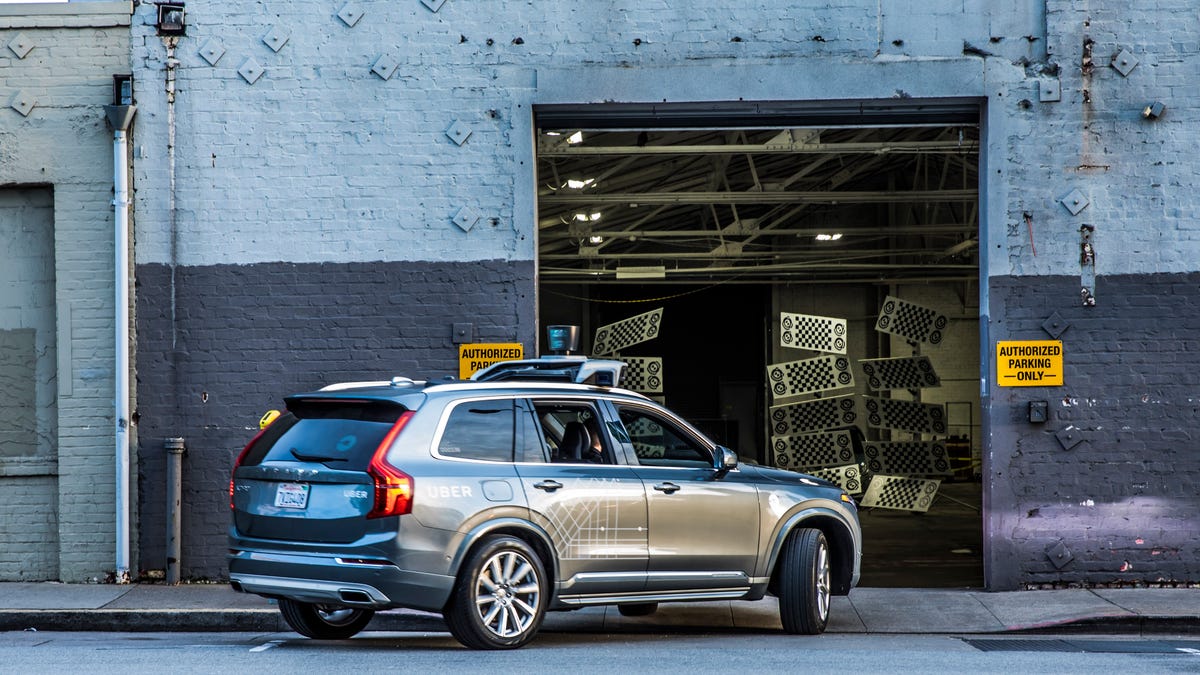Uber keeps self-driving cars on the road, challenging the law
The ride-hailing company brushes off California DMV, announcing it won't pull its autonomous cars from San Francisco streets. Now the state's attorney general is getting involved.

A self-driving Uber car enters a garage where the company houses its vehicles.
Uber and the state of California are in a standoff.
After Uber rolled out its self-driving cars to passengers in San Francisco on Wednesday, California's Department of Motor Vehicles told the ride-hailing company it was breaking the law and had to take its cars off the streets and get a permit.
Uber kept mum for two days, but has broken its silence.
"The cars are on the road today," Anthony Levandowski, Uber's vice president of self-driving technology, said in a conference call with reporters on Friday. "We're intending to continue."
Which, in turn, prompted a letter from California's Office of the Attorney General to Uber saying the company must "immediately remove its self-driving vehicles from California public roadways until it obtains the appropriate permit" or else the attorney general "will seek injunctive and other appropriate relief."
Uber made its name by pairing passengers with drivers via a phone app. Over the past six years, it's grown from small startup to multinational company with operations in more than 400 cities in 72 countries. The company has a history of launching products and features before getting the required permits. And, Uber's rollout of self-driving cars in San Francisco is no different. But, in doing so, lawmakers worry the company could be forsaking public safety and transparency.
Uber says the reason why it's not getting the permit is because the law doesn't apply to its self-driving cars. The company says that because humans constantly monitor its vehicles while driving and can take over control at any time, they aren't yet autonomous vehicles. Uber also says its self-driving cars aren't yet "capable" of driving without monitoring or active physical control.
"While these are considered state of the art today, they still require monitoring by a vehicle operator at all times," Levandowski said during the conference call. "We believe they are no different than any other car on the road today."
The DMV says, however, the law applies to the kind of technology in the vehicle, not whether a human is behind the wheel. So if the car is equipped to be autonomous eventually, it's subject to the law.
"It is illegal for the company to operate its self-driving vehicles on public roads until it receives an autonomous vehicle testing permit," the DMV wrote in a letter to Uber on Wednesday. "Any action by Uber to continue the operation of vehicles equipped with autonomous technology on public streets in California must cease."
Twenty other companies working on self-driving technology have already received permits from California's DMV, including Google, Tesla, BMW, Ford and Honda.
Now that Attorney General Kamala Harris' office has weighed in, reiterating that legal action will be taken against Uber if it doesn't get the necessary permit, the question is whether the company will still stand its ground.
"The legislation clearly defines what an autonomous vehicle is," Levandowski said. "It's a binary thing. You're either it or you're not it."
And Uber believes it's not it.
First published December 16, 4:02 p.m. PT.
Update, 7:11 p.m.: Adds letter from Attorney General's office and background information.
CA Attorney General letter to Uber by CNET News on Scribd

